Welcome to the Amira-Avizo Software Use Case Gallery
Below you will find a collection of use cases of our 3D data visualization and analysis software. These use cases include scientific publications, articles, papers, posters, presentations or even videos that show how Amira-Avizo Software is used to address various scientific and industrial research topics.
Use the Domain selector to filter by main application area, and use the Search box to enter keywords related to specific topics you are interested in.
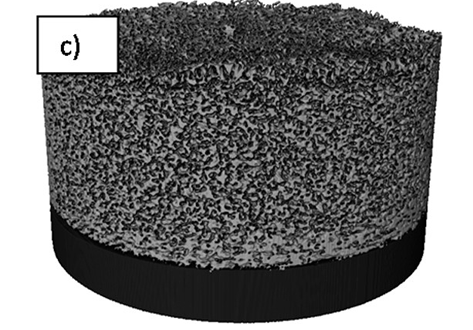
Visualizing the Carbon Binder Phase of Battery Electrodes in Three Dimensions
This study presents a technique to directly characterize the carbon and binder domain (CBD) in lithium-ion (Li-ion) battery electrodes in three dimensions and use it to determine the effective transport properties of a LiNi0.33Mn0.33Co0.33O2 (NMC) electrode. X-ray nanocomputed tomography (nano-CT) is used to image an electrode composed solely of carbon and binder, whereas focused ion beam–scanning electron microscopy is used to analyze cross-sect... Read more
Sohrab R. Daemi, Chun Tan, Tobias Volkenandt, Samuel J. Cooper, Anna Palacios-Padros, James Cookson, Dan J. L. Brett, and Paul R. Shearing
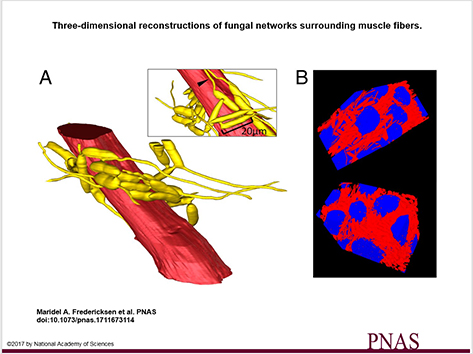
3D visualization and deep-learning reveal complex parasite networks in behaviorally manipulated ants
Microbial parasites may behave collectively to manipulate their host’s behavior. We examine adaptations of a microbial parasite in its natural environment: the body of its coevolved and manipulated host.
Electron microscopy and 3D reconstructions of host and parasite tissues reveal that this fungus invades muscle fibers throughout the ant’s body but leaves the brain intact, and that the fungal cells connect to form extensive networks.
Read more
Maridel A. Fredericksena, Yizhe Zhangb, Missy L. Hazenc, Raquel G. Loretoa,d, Colleen A. Mangoldd,e, Danny Z. Chenb, and David P. Hughes, Department of Entomology, Pennsylvania State University
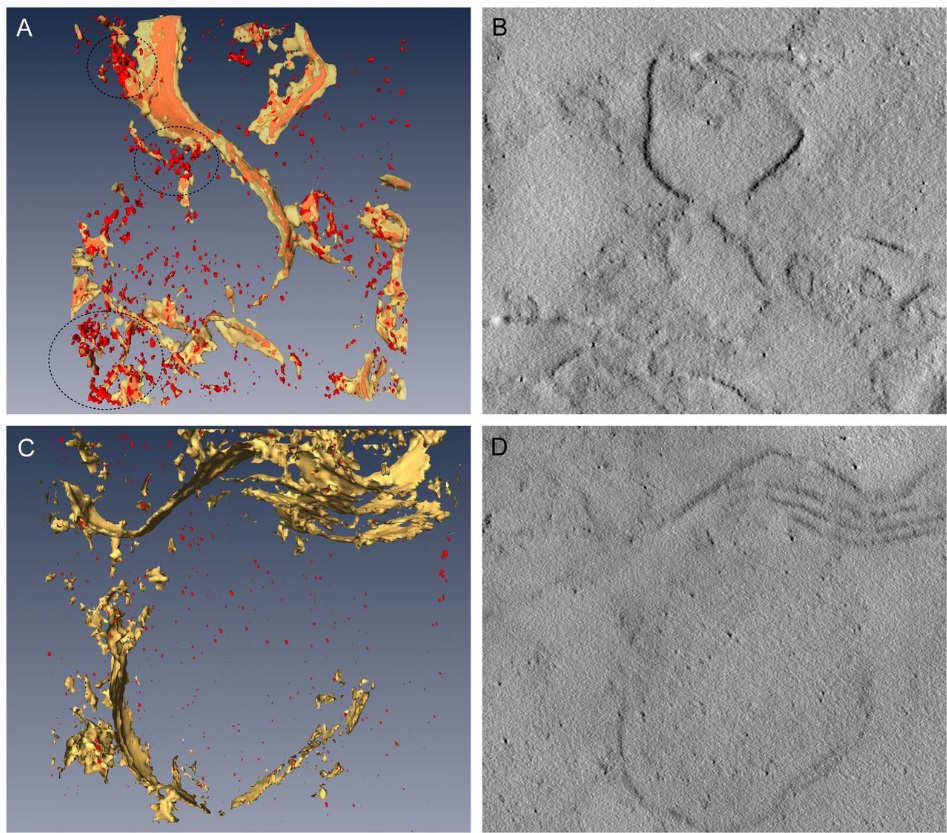
Three-dimensional imaging of the intracellular assembly of a functional viral RNA replicase complex
Positive-strand RNA viruses, which can be devastating pathogens in humans, animals and plants, replicate their genomes on intracellular membranes. Here, we describe the three-dimensional ultrastructural organization of a tombusvirus replicase in yeast, a valuable model for exploring virus–host interactions…
Read more
Isabel Fernández de Castro, José J. Fernández, Daniel Barajas, Peter D. Nagy, Cristina Risco
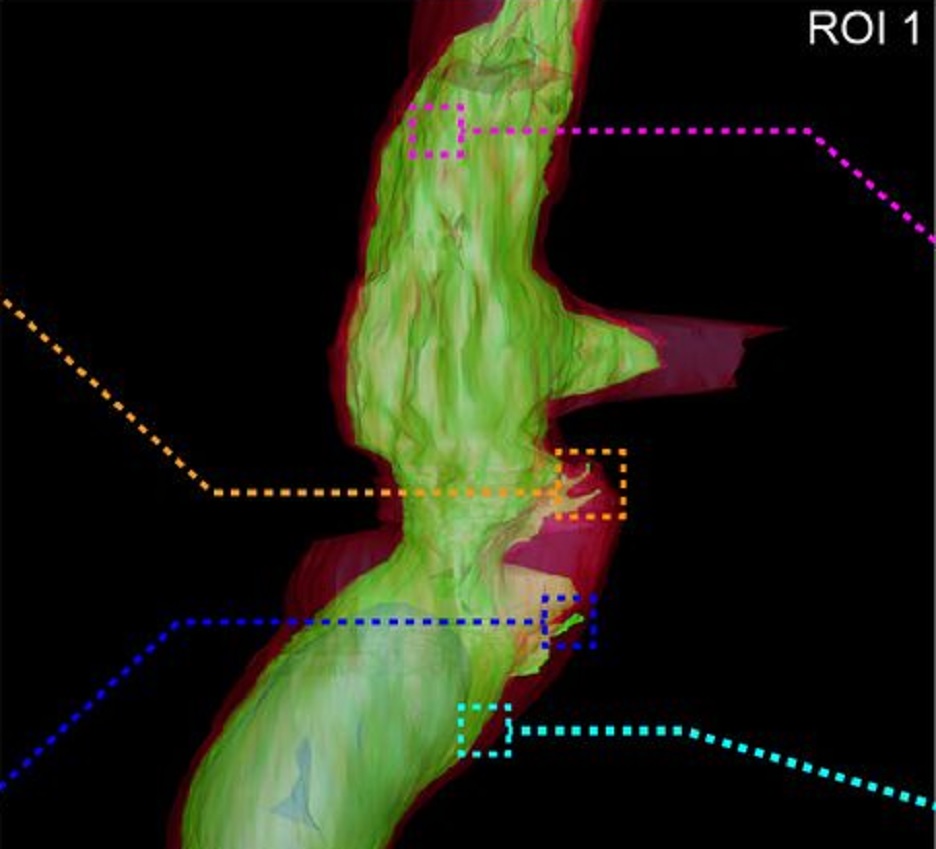
Fast and precise targeting of single tumor cells in vivo by multimodal correlative microscopy
Intravital microscopy provides dynamic understanding of multiple cell biological processes, but its limited resolution has so far precluded structural analysis. Because it is difficult to capture rare and transient events, only a few attempts have been made to observe specific developmental and pathological processes in animal models using electron microscopy. The multimodal correlative approach that we propose here combines intravital microscopy, microscopic X-ray computed tomography and thr... Read more
Matthia A. Karreman, Luc Mercier, Nicole L. Schieber, Gergely Solecki, Guillaume Allio, Frank Winkler, Bernhard Ruthensteiner, Jacky G. Goetz, Yannick Schwab
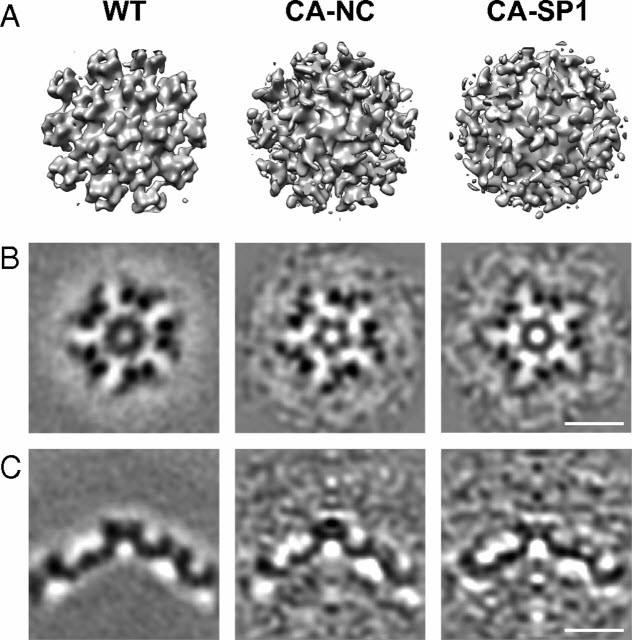
HIV-1 maturation occurs via multiple proteolytic cleavages of the Gag polyprotein, causing rearrangement of the virus particle required for infectivity. (…) How individual cleavages contribute to changes in protein structure and interactions, and how the mature, conical capsid forms, are poorly understood. Here, we employed cryoelectron tomography to determine morphology and high-resolution CA lattice structures for HIV1 derivatives in which Gag cleavage sites are mutated. These analyse... Read more
Simone Mattei, Aaron Tan, Barbel Glass, Barbara Muller, Hans-Georg Krausslich, and John A. G. Briggs
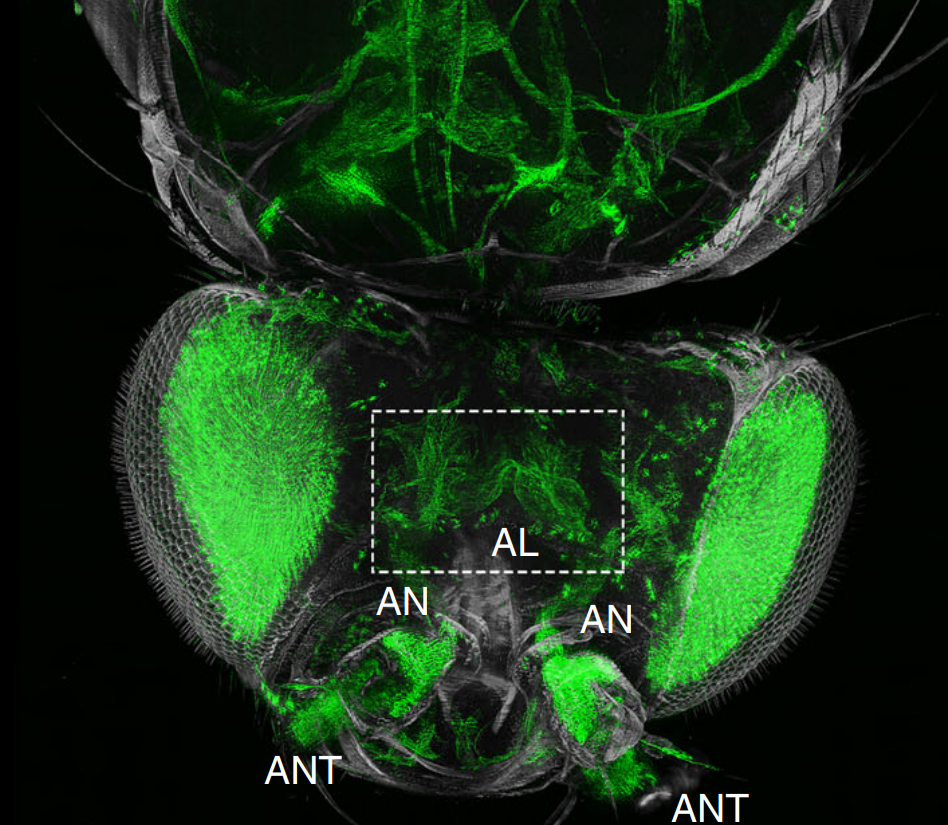
The fruit fly, Drosophila melanogaster, is an important experimental model to address central questions in neuroscience at an organismic level. However, imaging of neural circuits in intact fruit flies is limited due to structural properties of the cuticle. Here we present a novel approach combining tissue clearing, ultramicroscopy, and data analysis that enables the visualisation of neuronal networks with single-cell resolution from the larval stage up to the adult Drosophila. (…) This... Read more
Marko Pende, Klaus Becker, Martina Wanis, Saiedeh Saghafi, Rashmit Kaur, Christian Hahn, Nika Pende, Massih Foroughipour, Thomas Hummel & Hans-Ulrich Dodt
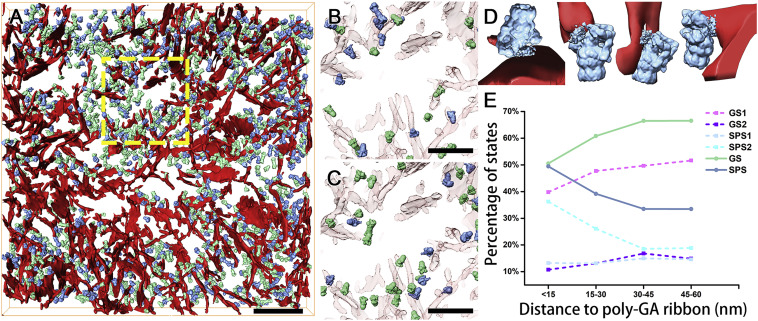
In Situ Structure of Neuronal C9orf72 Poly-GA Aggregates Reveals Proteasome Recruitment
Protein aggregation and dysfunction of the ubiquitin-proteasome system are hallmarks of many neurodegenerative diseases. Here, we address the elusive link between these phenomena by employing cryo-electron tomography to dissect the molecular architecture of protein aggregates within intact neurons at high resolution. We focus on the poly-Gly-Ala (poly-GA) aggregates resulting from aberrant translation of an expanded GGGGCC repeat in C9orf72, the most common genetic cause of amyotrophic latera... Read more
Qiang Guo, Carina Lehmer, Antonio Martinez-Sanchez, Till Rudack, Florian Beck, Hannelore Hartmann, Manuela Perez-Berlanga, Frederic Frottin, Mark S.Hipp, F. Ulrich Hartl, Dieter Edbauer, Wolfgang Baumeister, Ruben Fernandez-Busnadiego
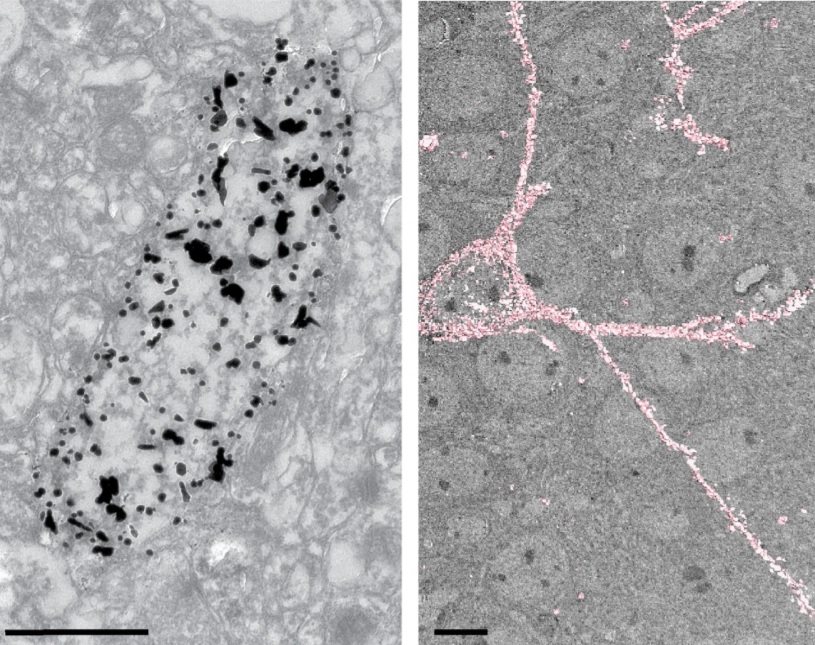
Analysis of neuronal arborization and connections is a powerful tool in fundamental and clinical neuroscience. Changes in neuronal morphology are central to brain development and plasticity and are associated with numerous diseases. Golgi staining is a classical technique based on a deposition of metal precipitate in a random set of neurons. Despite their versatility, Golgi methods have limitations that largely precluded their use in advanced microscopy. We combined Golgi staining with fluore... Read more
Katlijn Vints, Dorien Vandael, Pieter Baatsen, Benjamin Pavie, Frank Vernaillen, Nikky Corthout, Vasily Rybakin, Sebastian Munck & Natalia V. Gounko
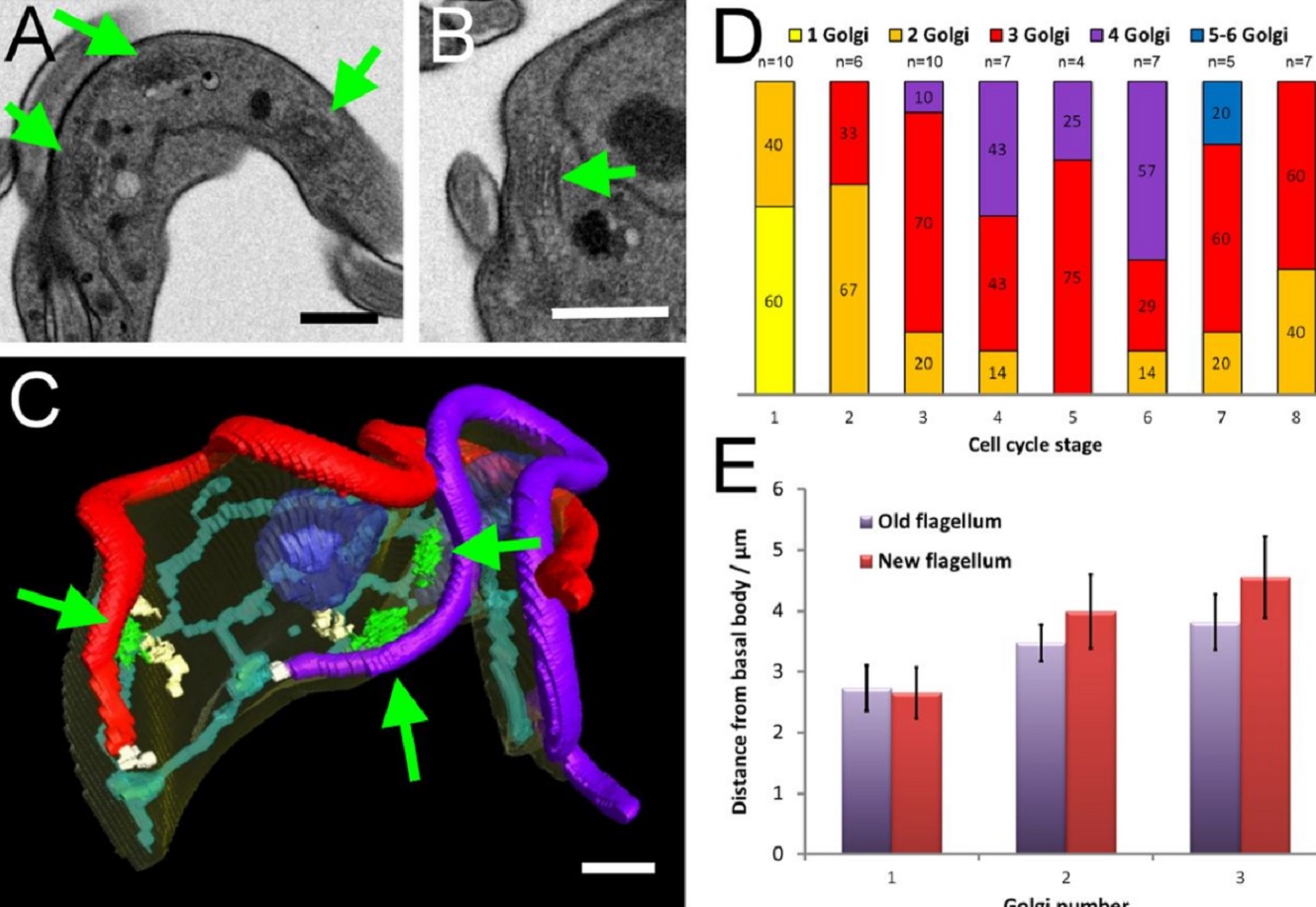
The major mammalian bloodstream form of the African sleeping sickness parasite Trypanosoma bruceimultiplies rapidly, and it is important to understand how these cells divide. Organelle inheritance involves complex spatiotemporal re-arrangements to ensure correct distribution to daughter cells…
Read more
Louise Hughes, Samantha Borrett, Katie Towers, Tobias Starborg, Sue Vaughan
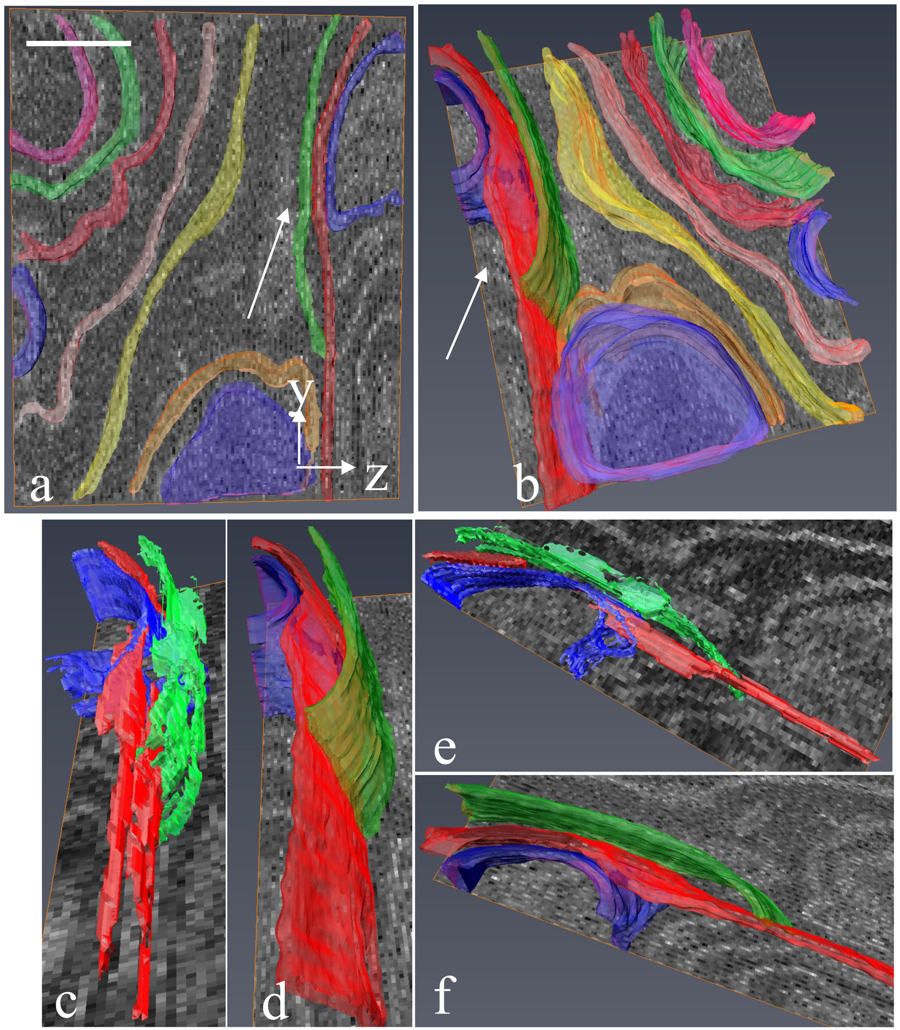
Serial block-face electron microscopy (SBEM) provides nanoscale 3D ultrastructure of embedded and stained cells and tissues in volumes of up to 107 µm3. In SBEM, electrons with 1–3 keV energies are incident on a specimen block, from which backscattered electron (BSE) images are collected with x, y resolution of 5–10 nm in the block-face plane, and successive layers are removed by an in situ ultramicrotome. Sp... Read more
Q. He, M. Hsueh, G. Zhang, D. C. Joy & R. D. Leapman
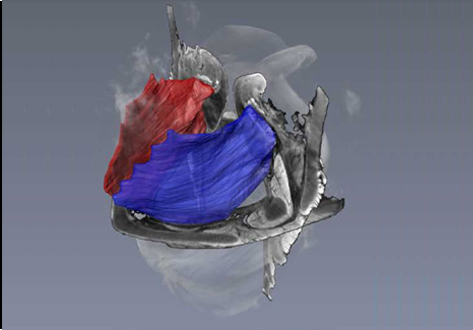
Juvenile Ovine Ex Vivo Larynges: Phonatory, Histologic, and Micro CT Based Anatomic Analyses
It is well known that the phonatory process changes during the life span. However, detailed investigations on potential factors concerned are rare. To deal with this issue, we performed extended biomechanical, macro anatomical, and histological analyses of the contributing laryngeal structures in ex vivo juvenile sheep models. Altogether twelve juvenile sheep larynges were analyzed within the phonatory experiments. Three different elongation levels and 16 different flow levels were applied to... Read more
Michael Döllinger, Olaf Wendler, Claus Gerstenberger, Tanja Grossmann, Marion Semmler, Hossein Sadeghi, and Markus Gugatschka
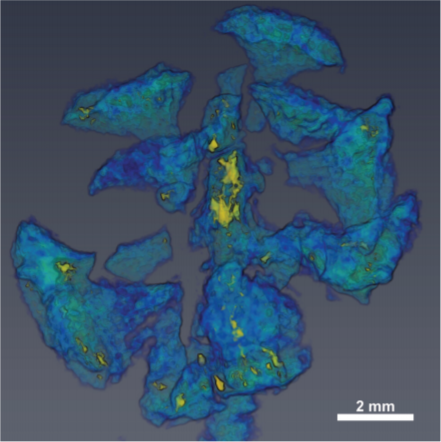
Computed tomography is an increasingly popular technique for the non-destructive study of fossils. Whilst the science of X-ray computed tomography (CT) has greatly matured since its first fossil applications in the early 1980s, the applications and limitations of neutron tomography (NT) remain relatively unexplored in palaeontology. These highest resolution neutron tomographic scans in palaeontology to date were conducted on a specimen of Austrosequoia novae-zeelandiae (Ettingshausen) Mays an... Read more
Chris Mays, Joseph J. Bevitt, and Jeffrey D. Stilwell
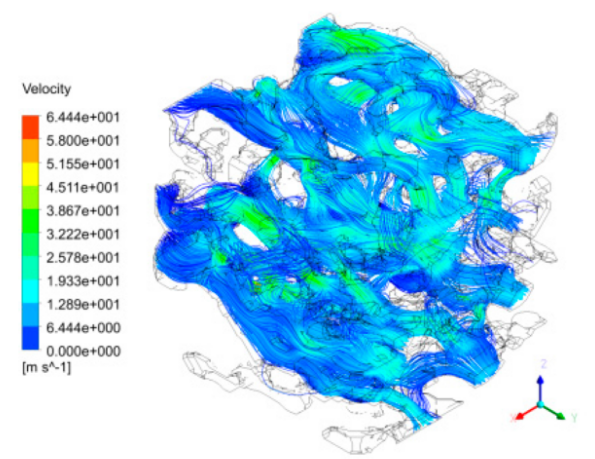
This paper used the X-ray three-dimensional (3D) microscope and acquired, through CT scanning, the 3D data of the long-frame coal sample from the Daliuta Coal Mine.
Then, the 3D datacube reconstructed from the coal’s CT scanning data was visualized with the use of Avizo, an advanced visualization software. By means of a gray-scale segmentation technique, the model of the coal’s micro-pore structure was extracted from the object region, and the precise characterization was then cond... Read more
Gang Zhou, Qi Zhang, Ruonan Baiand, Guanhua Ni

Modelling deformation and fracture in confectionery wafers
The aim of this research is to model the deformation and fracture behaviour of brittle wafers often used in chocolate confectionery products.
Three point bending and compression experiments were performed on beam and circular disc samples respectively to determine the ‘apparent’ stress-strain curves in bending and compression. The deformation of the wafer for both these testing types was observed in-situ within an SEM. The wafer is modelled analytically and numerically as a composi... Read more
Idris K. Mohammeda, Maria N. Charalambides , J. Gordon Williams , John Rasburn
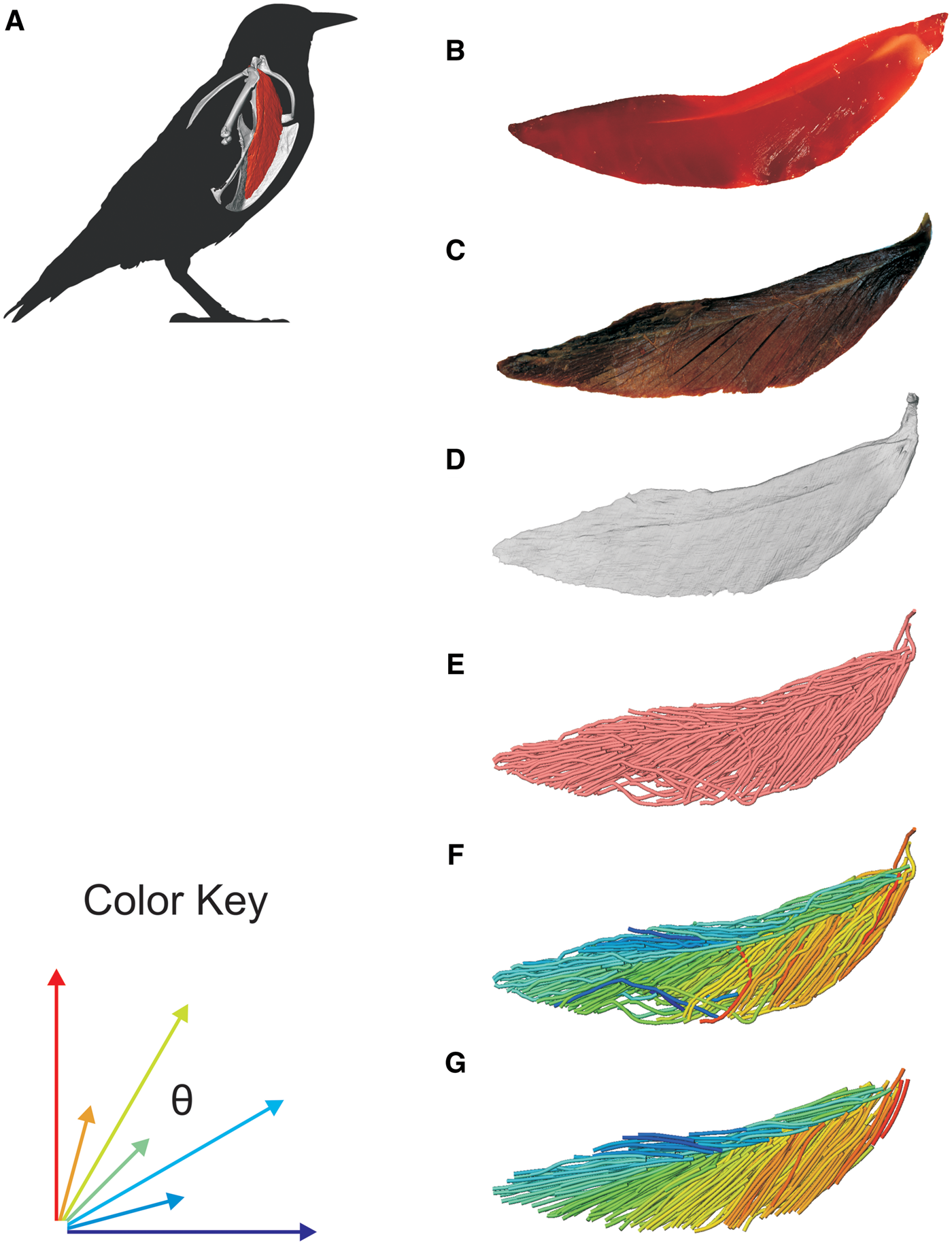
3D Muscle Architecture of the Pectoral Muscles of European Starling (Sturnus vulgaris)
Avian flight is achieved through a number of modifications to the body, including the pectoral girdle (…). Muscle architecture is a critical variable in determining the biomechanical function of the vertebrate musculoskeletal system; however, accurate three-dimensional (3D) understanding of muscle architecture has been historically difficult to acquire. Here, we present a musculoskeletal model of a European starling (Sturnus vulgaris) pectoral girdle generated from iodine contr... Read more
S.P. Sullivan, F.R. McGechie, K.M. Middleton, C.M. Holliday
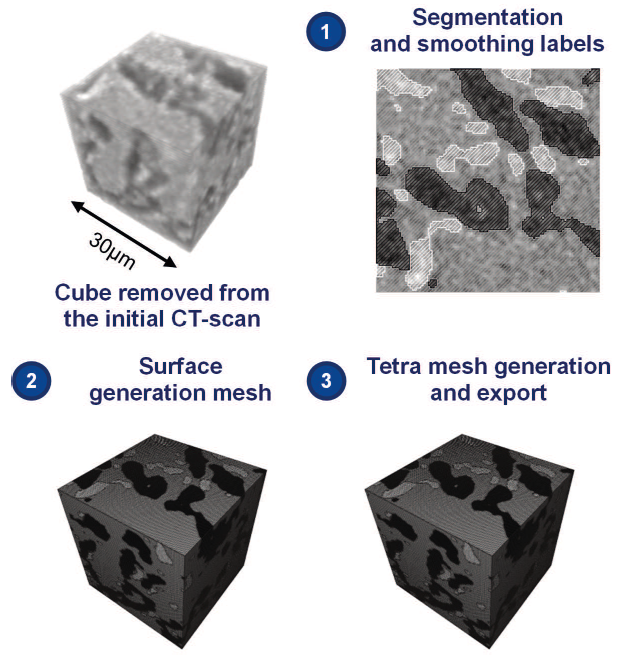
Current materials such nickel based superalloys cannot be used anymore and new materials are thus considered. For the hottest parts of jet engines, eutectic ceramics have potentially interesting features. In order to assess the thermo-mechanical properties of this material, numerical multi-scale analyses may be performed. Thus, a 3D finite element model was generated from a CT scan, representative of the microstructure and with a similar volume fraction. Effective elastic properties were calc... Read more
S. Gourdin, L. Marcin, M. Podgorski, M. Cherif, L. Carroz
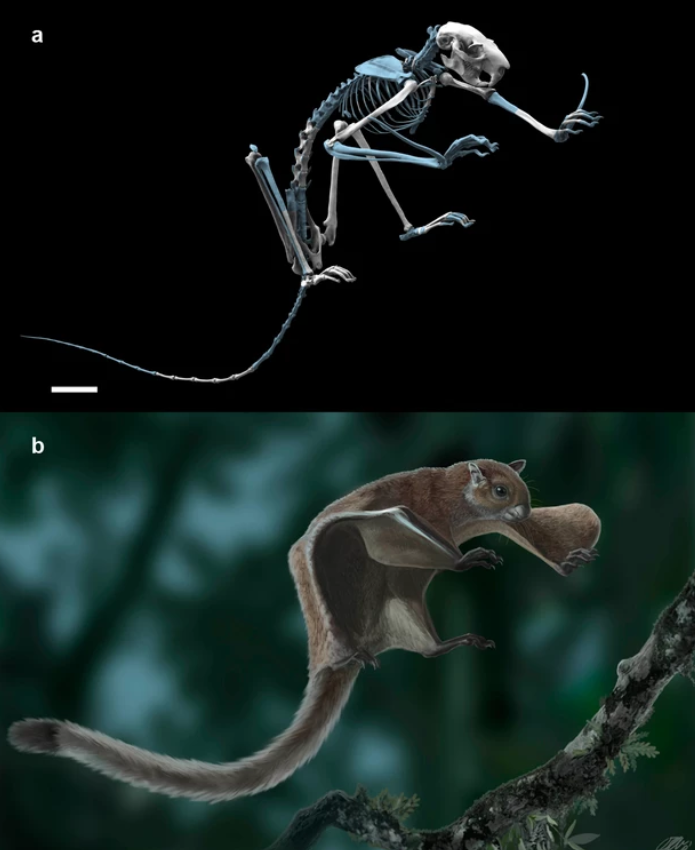
Oldest skeleton of a fossil flying squirrel casts new light on the phylogeny of the group
Here we report the oldest fossil skeleton of a flying squirrel (11.6 Ma) that displays the gliding-related diagnostic features shared by extant forms and allows for a recalibration of the divergence time between tree and flying squirrels. Our phylogenetic analyses combining morphological and molecular data generally support older dates than previous molecular estimates (~23 Ma), being congruent with the inclusion of some of the earliest fossils (~36 Ma) into this clade. They also show that fl... Read more
Isaac Casanovas-Vilar, Joan Garcia-Porta, Josep Fortuny, Oscar Sanisidro, Jerome Prieto, Marina Querejeta, Sergio Llacer, Josep M Robles, Federico Bernardini, David M Alba
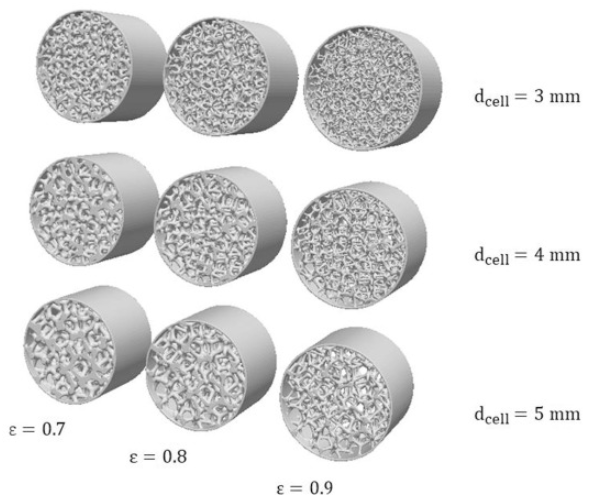
Open-cell foams as structured catalyst supports are promising candidates for the design of high throughput catalytic processes. In this contribution, we employ a coupled numerical and experimental approach to assess the pressure losses in foams. (…) we explore virtually-generated foam models and their 3D printed replicas for a combined CFD and experimental study of fluid dynamics in foams. In particular, we focus our analysis on the low Reynolds number regime, where deviations between t... Read more
Mauro Bracconi, Matteo Ambrosetti, Obinna Okafor, Victor Sans, Xun Zhang, Xiaoxia Ou, Claudio Pereira Da Fonte, Xiaolei Fan, Matteo Maestri, Gianpiero Groppi, Enrico Tronconi
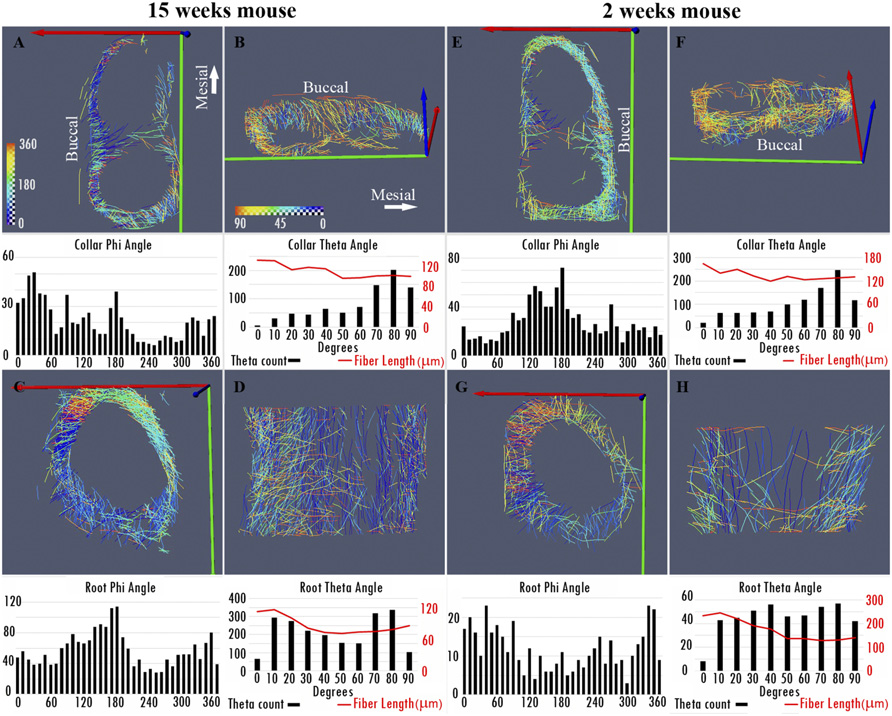
Nonuniformity in ligaments is a structural strategy for optimizing functionality
Ligaments serve as compliant connectors between hard tissues. In that role, they function under various load regimes and directions. The 3D structure of ligaments is considered to form as a uniform entity that changes due to function. The periodontal ligament (PDL) connects the tooth to the bone and sustains different types of loads in various directions. Using the PDL as a model, employing a fabricated motorized setup in a microCT, we demonstrate that the fibrous network structure with... Read more
Gili R. S. Naveh, Jonathan E. Foster, Tomas M. Silva Santisteban, Xianrui Yang, and Bjorn R. Olsen
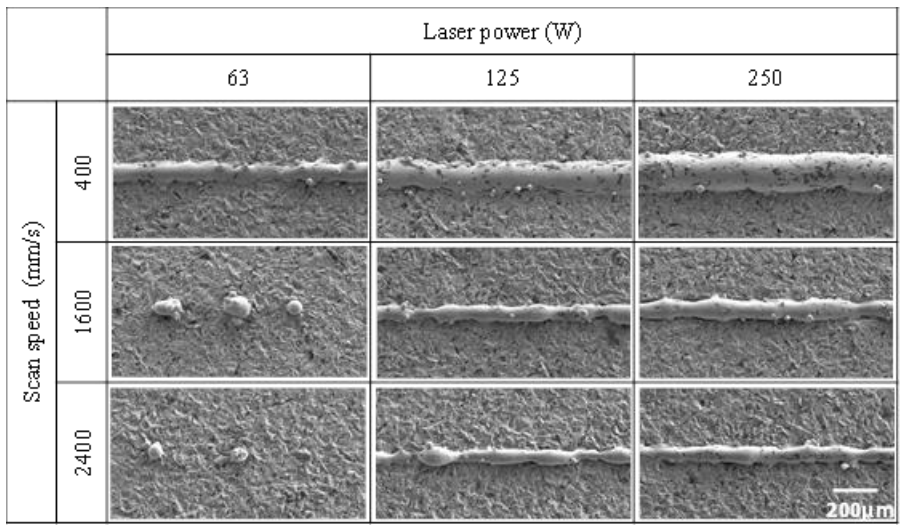
Two-fluid model to simulate metal powder bed fusion additive manufacturing
This paper reports our simulations of the metal powder fusion additive manufacturing process based on a two-fluid model. In simulations of metal behavior in which heat is applied by high-density energy sources (e.g., laser or electron beam), the aspects that need to be correctly modeled include boiling and evaporation, as well as melting and solidification. The potential of the two-fluid model to clarify numerous physical phenomena—deep penetration, plume generation, spatter generation due ... Read more
Noriko WATARI, Yuzuru OGURA, Noriko YAMAZAKI, Yukihiko INOUE, Keisuke KAMITANI, Yasuyuki FUJIYA, Masahiko TOYODA, Saneyuki GOYA, Toshiya WATANABE
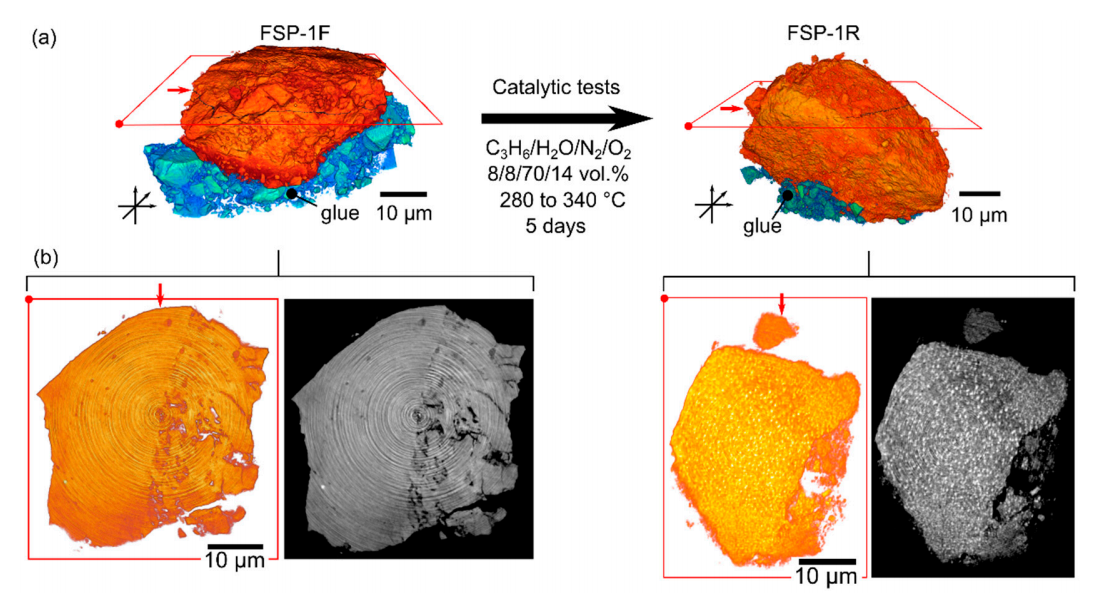
Structural Evolution of Highly Active Multicomponent Catalysts for Selective Propylene Oxidation
Multicomponent Bi-Mo-Fe-Co oxide catalysts prepared via flame spray pyrolysis were tested for selective propylene oxidation, showing high conversion (>70%) and selectivity (>85%) for acrolein and acrylic acid at temperatures of 330 ◦C. During extended time-on-stream tests (5–7 days), the catalysts retained high activity while undergoing diverse structural changes. This was evident on: (a) the atomic scale, using powder X-ray diffraction, Raman spectroscopy, X-ray absorption spectros... Read more
Paul Sprenger, Thomas L Sheppard, Jussi-Petteri Suuronen, Abhijeet Gaur, Federico Benzi and Jan-Dierk Grunwaldt